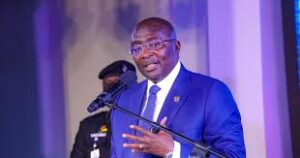Internal divisions escalate as Adwoa Safo criticizes NPP over potential loss in the 2024 elections

Former Dome-Kwabenya Member of Parliament, Sarah Adwoa Safo, has recently opened up about the challenges and perceived injustices she faced during her final years in Parliament under the New Patriotic Party (NPP). In an exclusive interview with Asempa FM on March 18, 2025, Safo shared insights into the difficulties she encountered, including being stripped of her influential role as Deputy Majority Leader and relegated to the backbench. This move, she claims, was part of a broader strategy to diminish her political standing within the party.
According to Safo, certain members of the NPP orchestrated efforts to tarnish her reputation. She believes that these efforts were not only personal but also strategically aimed at undermining her influence in Parliament. The former MP recalled how it took intervention from high-ranking party officials, including the NPP General Secretary and the Majority Whip, to restore her position. Despite the challenges, she emphasized that she remained committed to her role and her constituents, making her return to prominence in Parliament an important political moment in her career.
A central point of contention that Safo discussed in the interview was her decision to abstain from voting on the controversial Electronic Transactions Levy (E-Levy). This move, which caused considerable stir within the party, was met with mixed reactions, with some party members expressing dismay over her refusal to support the tax. Safo, however, justified her decision as one guided by principle and strong feedback from her constituents, many of whom were church members. These constituents feared that the E-Levy would only exacerbate the economic struggles they were already facing, making it impossible for her to support a policy that she felt would harm them further.
In her defense, Safo pointed out that her absence from the vote on the E-Levy was not a political maneuver but a decision rooted in the best interests of her constituents. She argued that, while the government sought to pass the bill, it was vital for her to prioritize the concerns of the people she represented, especially when they expressed overwhelming opposition to the measure. Her decision, however, led to a strained relationship with the leadership of the NPP, as her stance was seen by some as a challenge to the party line at a time when the government was struggling to secure enough votes to pass key policies, including the E-Levy.
Safo also took the opportunity to weigh in on the party’s performance in the 2024 elections, particularly in the context of its presidential candidate, Dr. Mahamudu Bawumia. The NPP’s poor showing in the elections had led to some internal blame being placed on Bawumia’s candidacy, with critics suggesting that his leadership may have been a significant factor in the loss. However, Safo disagreed with this assessment, arguing that the issues within the party ran deeper than just the presidential race.
Instead of solely blaming Bawumia, Safo called for a more thorough examination of the reasons behind the NPP’s loss, particularly in her own constituency of Dome-Kwabenya. She questioned why the party’s candidate, the son of former Speaker of Parliament Prof. Mike Oquaye, was unable to retain the parliamentary seat, which had long been considered a stronghold for the NPP. Safo pointed out that during her 12-year tenure as the representative for Dome-Kwabenya, she had successfully held onto the seat despite facing numerous political challenges. This, she suggested, indicated that the issues the NPP faced in the election went beyond the presidential candidate and required deeper reflection on internal party dynamics, candidate selection, and overall party strategy.
In her analysis, Safo implied that the NPP needed to address internal divisions and reconsider its approach to elections, as well as the broader political climate. She made it clear that a focus on party leadership and public perception, rather than solely blaming one individual or one race, was crucial to understanding the party’s loss and rebuilding its reputation for future elections.
In conclusion, Sarah Adwoa Safo’s interview shed light on the internal conflicts and challenges she faced within the NPP during her final years in Parliament. She highlighted her principled stance on issues like the E-Levy, defended her decisions based on the needs of her constituents, and called for an honest reflection on the party’s internal dynamics and performance in the 2024 elections. As the NPP faces critical decisions ahead, her insights into the party’s struggles and internal rifts will likely play a significant role in shaping future discussions about its path forward.






